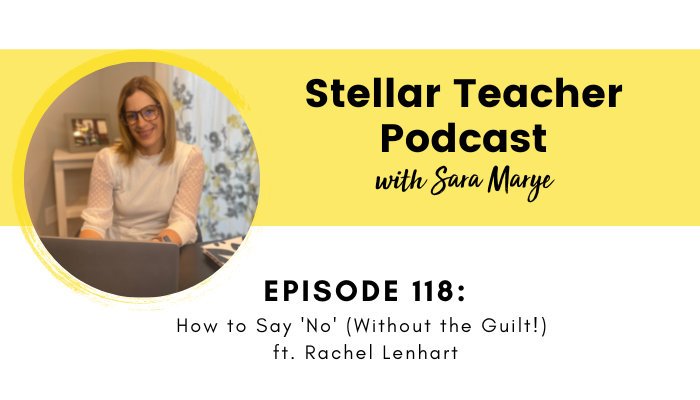
Click play below to hear how to say ‘no’ without the guilt:
No. How hard is it for you to say to someone when asked to complete a task, volunteer for a committee, make copies for a colleague, or anything else in your life? For most people, it is extremely difficult. And if they do, there seems to be a wave of guilt that follows the word no, even when you shouldn’t feel guilty at all.
If you’re wanting to say no and focus on yourself this year, today’s podcast is for you. I have guest Rachel Lenhart, who is a teacher life coach and host of the Chalk Full of Life podcast. Rachel joins us today to share how to say no without the guilt.
Another idea that might resonate with you, is this idea of being a people pleaser. Most teachers naturally want to help others, are multitaskers, and high achievers, which all lend themselves to being a ‘yes girl’. However, while that sounds good, the inability of how to say no without the guilt can damage your energy and cause resentment.
In order to focus more on doing what makes you happy, Rachel shares the importance of saying no, while also giving tips on how to not feel guilty in the process. So the next time someone asks you to cover a class or tutor their child beyond contract hours, remember how to say no without the guilt.
Meet Rachel
Rachel Lenhart
Rachel has been a classroom teacher for 20 years. She has taught grades K-4 throughout her career and is currently teaching 4th grade. She is passionate about helping teachers overcome and avoid burnout and set healthy boundaries so they can enjoy life in and out of the classroom.
When she is not teaching in her classroom or helping teachers, Rachel enjoys spending time with her husband, 2 busy boys, and their dog.
In this episode on how to say ‘no’ without the guilt, we discuss:
- 2 important reasons why you should say ‘no’ when it’s not a complete ‘yes’
- How to establish boundaries regarding your response to questions or favors
- The harsh reality of saying ‘yes’ to people please is a form of manipulation
- A simple definition of guilt in relation to your brain and values
- Rachel’s simple tip of starting small when practicing ‘no’
Related Resources:
- Check out the Stellar Teacher Reading Membership
- Listen to Rachel’s Podcast, The Chalk Full of Life
- If you’re enjoying this podcast, please leave a review on Apple Podcasts!
Related episodes and blog posts:
- Episode 102, Ways to Reframe a Students’ Thinking of Failure using Failure Friday with Andrea Burns
- Episode 98, How to Feel Empowered an Prepared When Taking a Sick Day with Kelsey Sorenson
Connect with me:
- Join my newsletter
- Shop my TPT store here
- Instagram: @thestellarteachercompany
- Facebook: The Stellar Teacher Company
More About Stellar Teacher Podcast:
Welcome to the Stellar Teacher Podcast! We believe teaching literacy is a skill. It takes a lot of time, practice, and effort to be good at it. This podcast will show you how to level up your literacy instruction and make a massive impact with your students, all while having a little fun!
Your host, Sara Marye, is a literacy specialist passionate about helping elementary teachers around the world pass on their love of reading to their students. She has over a decade of experience working as a classroom teacher and school administrator. Sara has made it her mission to create high quality no-fluff resources and lesson ideas that are both meaningful and engaging for young readers.
Each week, Sara and her guests will share their knowledge, tips, and tricks so that you can feel confident in your ability to transform your students into life-long readers.
Tune in on your favorite podcast platform: Apple, Google, Amazon, Spotify, Stitcher, and more! If you’re loving this podcast, please rate, review, and follow!
Podcast (stellar-teacher-podcast): Play in new window | Download
Sara
Hey there friend and happy Monday. I’ve kind of got a big question for you. Do you ever feel guilty for saying no? If it’s your principal asks you to take somebody’s class or to volunteer for a specific committee or a parent asks you to tutor or a co worker asks you to make copies or even a friend or neighbor asks you for coffee, and you’re just not into it.
Sara
I know that I have a really hard time saying no. And usually when I say no, I have a lot of guilt that comes along with it. And while this is something that I personally have been working on and getting better at, I still feel really guilty when I tell people no. And I feel like I need to justify and explain and give reasons.
Sara
And ultimately, it’s because I am a people pleaser. And I’m also a high achiever and I really hate the idea of letting people down. And I think a lot of teachers fall into those same categories as people pleasers and perfectionist and high achievers, and we just want to make everybody happy.
Sara
But ultimately, when we are saying yes to everything, and we are saying yes to everyone else, then we are ultimately saying no to ourselves, and the things that are truly important to us. You know, I think about the years that I spent saying yes to things that I didn’t really want to do. Or worse yet, things that I ended up resented doing because I really wasn’t that excited about it.
Sara
Well, if you can resonate with any of that, then today’s episode is for you. I spoke with Rachel Lenhart who is a teacher life coach. And she’s also the host of the Chalk Full of Life podcast. And Rachel talks about how we can say no, without feeling guilty. And I really think that this is such an important conversation for us to have at the start of the year, as we are developing new routines and habits that are going to carry us all the way through 2023.
Sara
I really want you to feel empowered to say no to the things and the requests and the demands and the people that don’t actually light you up or bring you joy, and not feel guilty about it. So this conversation with Rachel is going to help you get started saying no, without the guilt. So let’s jump into this conversation.
Sara
Hi, Rachel, welcome to the podcast. And so happy to have you on the show today.
Rachel
Hi, Sara. It’s so great to be here.
Sara
So I am super excited for this conversation we have. So we are going to be talking all about how to say no without feeling guilty, which I feel like is just a really, I don’t know an appropriate topic as we start off this new year. But before we get into that, can you go ahead and introduce yourself and tell my audience a little bit about who you are and what you do?
Rachel
Sure, like I said, my name is Rachel Lenhart, and I am from Chalk Full of Life. And I’m a fourth grade teacher currently still in the classroom. And I’ve been teaching 19 years and a little bit more than that. And I also right around the time of the pandemic decided to get involved in life coaching. And I became certified and I just wanted a way to teach teachers how to have a life outside of the classroom.
Rachel
Because we’re so good at making lesson plans, we kind of forget to make life plans or we make the excuse that we can’t because we have all of this schoolwork to do. So I just wanted to be that like beacon of light that teachers can look towards to know that you can do both, you can excel in the classroom and also outside of the classroom. So that’s a little bit about how I’ve come to where I am today.
Rachel
And I the reason I did that was because I burnt myself out like two times and I mean legit, like crying on the kitchen floor telling my husband I don’t think I can teach anymore. I need to quit kind of burnt out. And I pulled myself out of it two times. And I thought you know, like, I can share my story and teach other teachers how not to do what I did. And so that was kind of how I I got involved in life coaching.
Sara
I love that. And first of all, I used to be a fourth grade teacher. And so I just like there’s a special place in my heart for fourth grade. And when you were figuring out how many years you’ve been teaching, I feel like I do that, too. I’m like, wait, has it been 17? Has it been 18? Like, how many that it makes me feel old. So I’m, like, more than 15 years in education.
Rachel
I think it’s like 20, but I had some maternity leave. So like, I don’t know, it’s been a long time.
Sara
It’s been a minute. So I just love that you sort of have jumped into this world of life coaching. And I often think back to like, when I was in the classroom, I’ve been out of the classroom for a couple years. And the last three years I worked in a school, I worked as an assistant principal and experienced burnout in the role of an administrator. But I just feel like you know, with especially since COVID, like with the climate of education, like teachers.
Sara
And not even teachers, let’s just say, everybody, everybody needs support with making like what you said those life plans and figuring out how to create that sort of, you know, we always talked about work life balance, but it is achievable with the right tool. So I love that. Have you want to put you on the spot here a little bit. But have you noticed a difference, since you’ve gone down this path of life coaching in terms of how you’re able to manage the stress of still being in the classroom?
Rachel
Yeah, well, the pandemic was just a little wild for everybody. And I think I kind of lost a sense of like, what I was supposed to be doing it because I was teaching in my house. And so literally, I could not get out of it. So there for a while, I kind of let things kind of creep back in. But once we got back to quote unquote, normal, like in the actual classroom, again, I went back with some pretty hard boundaries in place.
Rachel
And not to say that I wasn’t like being the best teacher, I could be, because I still was, but I was also saying, I will teach my heart out from 8 until 3:40. But then I put my mom hat on, and I am, you know, there for my boys and my husband. And not to say that I never ever take a thing home, but I have learned so much with creating that space and creating that, that area to just kind of, you know, do the things that you enjoy.
Rachel
Because if you just work, work, work, work work, you’re going to end up first of all resentful, and then burnt out. And so many of us are already there. And I think it’s a causing a lot of teachers to leave that and amongst other things, too. But I think just being able to put those boundaries in place and hold those boundaries, because it’s one thing to say I’m going to leave by four. And it’s another thing to actually walk out that door at four o’clock.
Sara
Yep, I have been there many, many boundaries in my life and failed, failed to follow through with them. But I can imagine that part of setting these boundaries and figuring out that balance is learning how to say no, which I’m excited for this topic. Especially because I you know, I feel like me myself, personally, I am such a people pleaser, that when somebody asks me to do something, my immediate response is always yes.
Sara
Like, yes, I want to be helpful, you know, so on this topic of, you know, how can teachers say no, without feeling guilty? Can we just start off with like, why is it important for teachers even to consider no, as a response if they’re being asked to do anything or something?
Rachel
Exactly. I was such a Yes, girl, too. And it’s still kind of like my natural inclination is to say yes, but I have to stop myself. And the number one thing that I think matters most when you are being asked to give someone you know, your energy or your time, and it’s something that you haven’t already, like, volunteered for, it’s something that someone’s asking you, I think you just need to check in with your heart and your gut. And ask yourself, if you’re feeling like a 100%, enthusiastic, no hesitation, yes, then it’s a yes.
Rachel
But if you are kind of like, I kind of don’t want to, but I’m worried what they might think and you’re trying to like save face, then it’s probably a no. And the number one thing, the other thing that you want to protect is your energy. So because if you’re not protecting your energy, and you’re giving it to things that you’re not 100% like in love with, then you know you’re given giving the best part of yourself to something that’s not filling your cup.
Rachel
And that might also fill you with some resentment and negative energy. And that’s only going to bring you down in the end. So it’s really actually the best thing for you to sometimes say no. And that might seem like counterintuitive to us because a lot of teachers were just such like people pleasers at heart. It’s better to say no to protect your energy. So it’s actually doing you a world of good when you set that boundary and say no.
Sara
I yeah, I love how you said just the whole like when we say yes to things that aren’t like filling us up, like we’re giving the best part of ourselves to something that isn’t even necessarily like producing like fruit, you know, or something that’s going to give us a return or something that’s going to even benefit the person that we’re agreeing to help because it might turn into resentment or you know, depleted energy and other areas. So I love just sort of that like check in, right? So it’s like before you say yes to something that will check to make sure that that’s something that you actually want to do.
Sara
My mother in law always had this really good advice she had, she had three boys. And when they were like, of the dating age, and you know, picking their significant other, she would always say, Yes, as a yes or no is a no, no, maybe is a no. So it’s like, unless, unless you’re 100%, yes, like, if you’re like that, maybe it’s a no, which I think is kind of true for like anything we agree to, you know, yeah, like, maybe it’s probably a no, that’s so true.
Sara
So I love all of those. But like, how, again, going back to this whole, you know, like being a people pleaser like, how can you say no, without feeling guilty? Because I think, you know, saying no, is one thing, but then how do you sort of manage the emotions of like, post saying, no, like, you’ve made the decision, but then it’s like, you still might feel bad.
Rachel
Right? I talk about guilt a lot on my podcast. And one of the things that I’ve talked about was that guilt is just your brain, noticing that you have two conflicting values. And value, one might be something that you believe in what ever the cause that you’re being asked to do. And you might think that it’s a great thing. And then your second value might be that, you know, you’re not going to show up as your best self a few if you agree to say yes, and so the guilt comes up, because you can’t meet both of those values at the same time.
Rachel
And so but only one can win. And so you feel bad about not sufficiently meeting your other core value. So what’s helpful to do when when these kinds of situations arise is to simply recognize that both of those values are great values to have, they’re both pure and honest and positive, and you’re wanting you’re wanting to help the world. But because only one of them can win, it needs to be you, it needs to be your health, your wellness, whatever is going to, you know, to light you up and set your heart on fire.
Rachel
And if it’s just like, oh, I want to do this, because they’re my friend, or they’re my principal or what you know, whoever it is that’s asking you, if it’s not something that’s going to benefit, like your own personal wellness, it’s going to bring you down or add stress. In the end, it’s not going to help you. So I’ve said before that you just have to acknowledge that guilt and just be like, Hey, thanks, guilt, I see you. I know you’re there. But that means that I have two great things I’m trying to decide between.
Rachel
And you also just need to know that you don’t always have to explain yourself. And I I still to this day, kind of struggle with that. Because that’s going back to that being a people pleaser. I always feel like I have to say, oh, no, because and then I need to give this like, ginormous thing that, you know.
Sara
Justifications, like, here’s the you know, this, this major thing is happening, which is why I can’t do this.
Rachel
Exactly. Like I want a trip to Paris. So I’m sorry, I can’t go like something crazy, right? But really like you don’t owe them any explanation. And I don’t know who coined this phrase, but like, no is the complete sentence and love it. That’s all we need to know, like, no full stop. And you don’t have to say it like snarky or anything. But like, you know, just a polite, no. Or you can even say, No, thank you.
Rachel
That’s all we need to say. We don’t need to explain ourselves. And I know that is totally easier said than done. But once you try it and practice it and keep doing it, you will get better at it. Because I know I did. And I was like the world’s biggest Yes, girl.
Sara
I can imagine that this takes like some practice getting getting to just say no without an explanation. I can think of many instances even within this past week where I’ve said no to somebody, but I give the reason. And I’m like, why don’t you think of that reason? Like I didn’t, I didn’t need to give an explanation to them. They didn’t even ask for an explanation.
Sara
But I first of all, I want to go back. I love how you explain what guilt is. I feel like I think that’s like one of those things where it’s just like we we can identify that feeling. And we know that like what that feeling is, but it’s like I’ve never had anybody explain exactly what guilt is. But that explanation of like, two conflicting values, it’s like, okay, wait a minute. I think we associate guilt is like almost like a negative emotion.
Sara
But like with the way you explain, it’s like, okay, wait a minute, this isn’t necessarily like a bad thing. This is just an awareness that I’ve got two values, and they both can’t win. So we just have to pick the one that’s going to benefit us, but I just feel like having that clear understanding of guilt almost makes it seem like not as bad of a thing to experience. So thank you for sharing that. That was really great.
Sara
Yeah. Okay, so what happens when we say yes, but we really want to say no. You know, like we said, it’s like, this is one of those things where I’m sure it takes some time to get used to this habit of saying no so as we’re on our say no journey, like what happens if you say yes, but sort of like in your gut or after you’ve made that agreement, you’re like, shoot, that was the wrong thing to do?
Rachel
Yeah, so more often than not, you probably said yes, because you were trying to people please like you wanted don’t want to let somebody down or you, you know, didn’t want to look bad in front of someone. And that’s, you know, people pleasing. And in the end people pleasing isn’t, you know, you being nice necessarily to someone, it’s actually a form of manipulation. And, and I know that sounds really like harsh to hear. So like.
Sara
My eyes just got really big.
Rachel
I know. Because when you break it down, we can start to turn this around is to see like, let’s just see it for what it is. So when you say yes, from a negative space, of not really wanting to do that thing that someone asks you to do, you’re saying what the other person wants you to say. And so it has everything to do with you wanting them to like you. So it’s like you are in a way manipulating them to like you.
Rachel
And even though that sounds like really harsh, I can see that. That makes sense. That’s like, what when we break it down, like you’re trying to get their respect, you’re trying to get brownie points you’re trying to, you know, save face or you know, whatever that might be for you to say yes, when you really want to say no. So it is a kind of a manipulation to get them to like you or to get on their good side or whatever, whatever that might look like.
Rachel
And so when I first heard that, I was like, like you when you made that face was, like really hard. But then the more I processed it, I was like, Oh my gosh, that’s really like, that’s really true. Like when I yeah, when I commit to this, you know, extracurricular activity that I was asked by an admin to do, I’m trying to like win brownie points and look good in their eyes. It has everything to do with me looking good. And not me wanting to actually do it for the right reasons.
Sara
Yeah, but I mean, that totally, that totally makes sense. And I mean, I just think like, you know, it is kind of harsh to say the manipulation, but it’s true. And it’s like, we want people to like us, but we want people to like us because of us not because we’re doing something that they want us to do that we’re not really invested in because then it’s like, that’s not really our true selves.
Rachel
Yes, yes, exactly.
Sara
So even if we know we should, like say no to things, right, like, why is it our tendency to say yes, like, what sort of, I don’t know, the psychology of behind this? I think especially with teachers, you know, we’re like, why is it that so many teachers like say yes to things like we overcommit, we stretch ourselves way too thin? Like, why is that?
Rachel
I just think because as teachers in general, this is a generalization, but teachers in general, are just that people pleasing type of personality. Like, I don’t know about you, but like I was the goody two shoe growing up, I, you know, wanted to always have honorable grades. I never wanted to mess up. I was a rule follower. I’m an Enneagram Three, like, I think a lot of teachers fit that mold. Obviously, not everybody. But a lot of us do.
Rachel
And I think a lot of us are, and I say us I include myself, we’re afraid of what others are going to think if we say, No, we’re afraid we’re going to let somebody down, disappoint somebody. And for all of those different reasons, we tend to be more willing to make ourselves feel miserable, rather than face the possibility that the person who asked us to do something might think less of us. So we need to remember that other people’s opinions are none of your business. And I think Rachel Hollis might have said that, but other people’s opinions of you are none of your darn business.
Sara
Which is such a hard thing to actually like, embrace.
Rachel
Yes, it is it is. But I’m speaking from personal example, it is hard to accept that. But once you do, that, it’s so freeing, because you don’t have to people please anymore. And you can confidently and unapologetically say No.
Sara
I love it. So I hope that the teachers listening to this are feeling just a little bit more encouraged and empowered to like, really just think through kind of like what you said at the very beginning. You know, it’s like, when somebody asks you to do something, really check in with yourself and think, Is this something that I want to do? And I’m excited about doing? Or are you doing it out of a sense of obligation, or a sense of, you know, feeling of fear, or out of this idea that you’re going to do something because you feel like you’ll get something from somebody else, like in return?
Sara
You know, all of those things. And if it’s something that you want to do say yes, but if it’s something that you don’t want to do, then say no, full stop with no explanation. So that can be hopefully our resolution going into this new year.
Sara
Any other little tips for teachers who are wanting to sort of make a change in you know, because I’m assuming this is like a big behavioral change. So like any sort of tips for teachers who are like, Okay, I want to make this this change, but this feels like a hard thing, like a hard behavior adjustment for me to make.
Rachel
Yeah, I would just say start small. Like don’t, don’t start with some huge thing. I would say just start small with like, just maybe saying no to, you know, a little thing and just I can’t think of an example off the top of my head, but something that’s small and not really going to have an impact on much and then just practice that and maybe start with people that are more of acquaintances rather than someone that you know, you may have a deeper connection or relationship with.
Rachel
But I always just recommend with starting small, and just just do it just try saying no to something that’s not going to have a big impact. You know, don’t say no to your principal, when they ask you to, you know, do something that you really absolutely have to do. Not saying that.
Sara
But if somebody that you just met, like, Hey, you want to meet for coffee, or if somebody’s asking you to, like, tutor their kid early in the morning or something like that, you can say no.
Rachel
Yeah, exactly. That’s a great example. Like, if a parent asks you to do something that really isn’t within your contractual bounds, like tutoring or, you know, meeting before school or after school, you can just gently say, you know, I’m sorry, but I’m not able to make that work. And then that’s it. You don’t have to say, I’m not able to make that work, because I have to drop my kids off at daycare or whatever, and you just, I’m not able to make that work. Full stop.
Sara
I can imagine that once you get really good at this, it does feel really empowering to have because you feel like you’re maybe a little bit more in control of your situation and circumstances and you don’t always just have to say yes, like you at the end of the day get to be the one to make that decision. Absolutely. I love it.
Sara
Okay, well, this was really, really great. Do you mind if we ask a few hotseat questions here? I always like to wrap up my interview. Go right ahead. Some fun, sort of some fun off topic question. So we will ask one that is related to education. So what is your favorite thing about working in the field of education?
Rachel
That’s a hard, that’s a big hard question. There’s so many things that I do enjoy and love about education. Probably one of the best things that I love is that you cannot predict how your day is going to go. And that’s sometimes a great thing and sometimes it’s like a what in the world just happened.
Rachel
But like I just love that how no day is ever the same. And you have a schedule on paper. And you know full well going into every day that is most likely not going to happen that way. But just embracing it and going with the flow and just you know, learning to have those teachable moments. I just love how every day is just never carbon copy and never the same.
Sara
I love that perspective. Keeps things happen. Absolutely. Okay, what’s your favorite way to unwind and de stress after a long day or a long week?
Rachel
I love to just if it’s nice now I’m in like the northeast, I’m in Pennsylvania. So now it’s cold and snowy, but on those nice warm days, I like to go for a walk. We have a nature trail right down at the end of our street. And I love to just go for a walk, pop in a podcast, and just tune out the world.
Rachel
But now that it’s winter and cold, I love to just bundle up with my blankie and fireplace and put on I’m really loving like The Crown and any like historical fiction documentary series, something like like The Crown or there’s other things I’ve watched too, but I just love to watch like a docu series. I’m a little nerdy like that.
Sara
I’m a fan of a documentary. Like any any sort of documentary I I’m into it. Okay, one destination that you’re hoping to travel in the next decade.
Rachel
Oh, this one is easy. Bora Bora. Oh, and I want to stay in one of those huts above the water or the water. Yes. Yeah. Yeah, that’s where I want to go.
Sara
We’ll check in and a decade from now and see if you made it. And last one favorite book or movie that you’ve read or seen this past year?
Rachel
I was a little slow on reading this book. I feel like everyone read this book before I had read it Untamed by Glennon Doyle. Oh, yep. That’s a good one. It sat on my nightstand for like, literally a full year. And then over the summer, I threw it in my carry on and read it on vacation. I read it twice. I read it once on vacation, and then I read it on the plane ride home. It is fire. Yeah. Oh my gosh. And I highlighted like all the things.
Sara
That’s awesome. Okay, I love it. Well, Rachel, thank you so much for joining me today. I just love your perspective on you know how teachers can say no without feeling guilty. And so I just appreciate you being willing to come on here and share your expertise and your insight. Where can my audience find you online and connect with you?
Rachel
Yeah, so I am Chalk Full of Life, and I’m on Instagram, and I am on Tik Tok. And I also have a podcast, the Chalk Full of Life podcast, and I release episodes every Monday. And then I also have a website. It’s called chalkfulloflife.com.
Sara
Awesome, and we will link to all of those in the show notes. And so if you are looking for another podcast to add to your list, definitely go check out Rachel’s podcast. It’s fantastic. So Rachel, thanks again. And I can’t wait to chat with you again soon.
Rachel
Thank you so much, Sara.

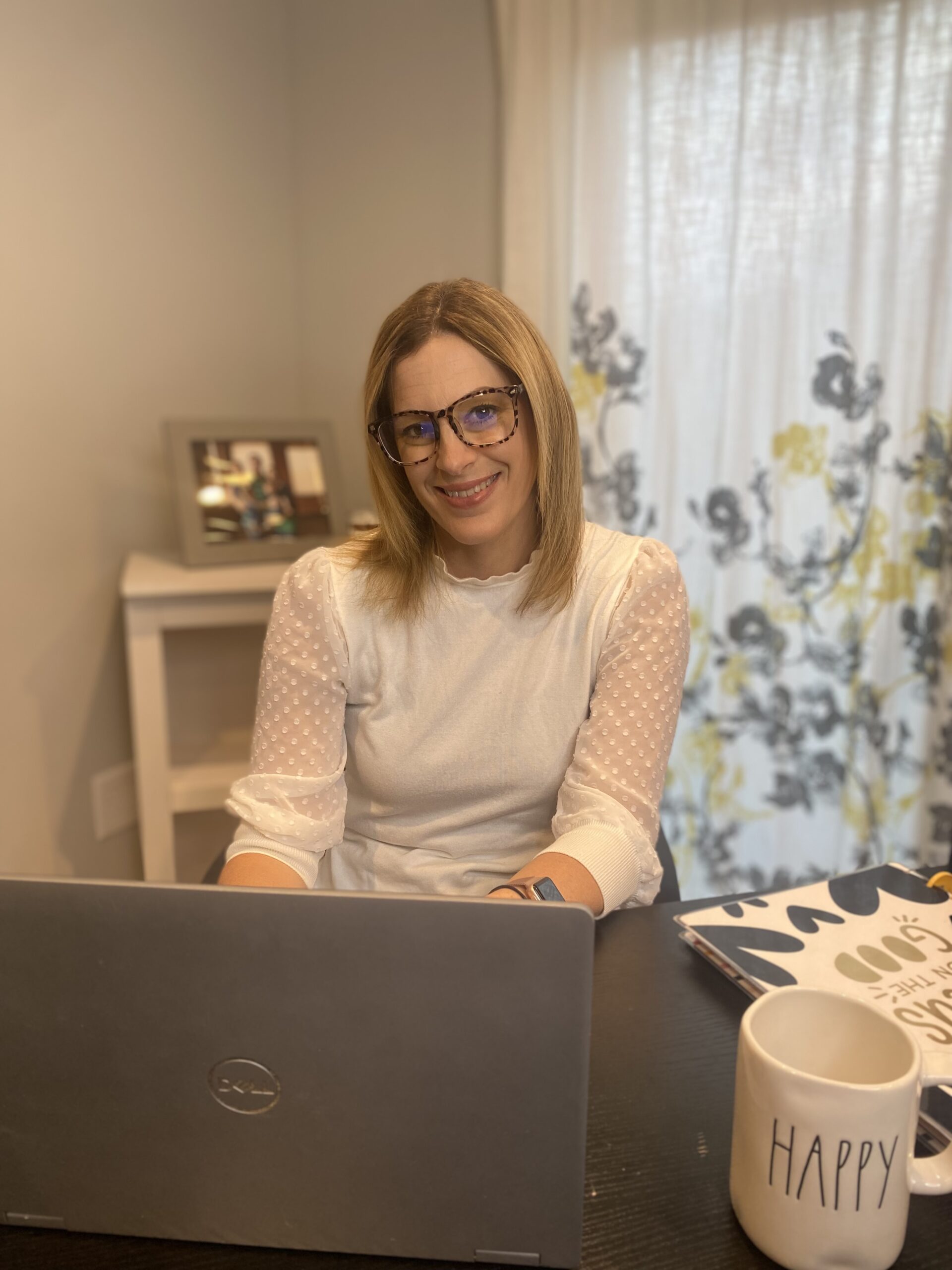
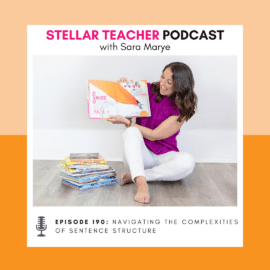
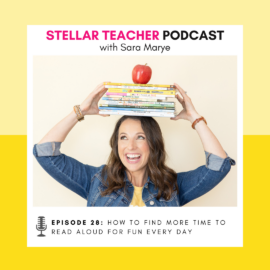

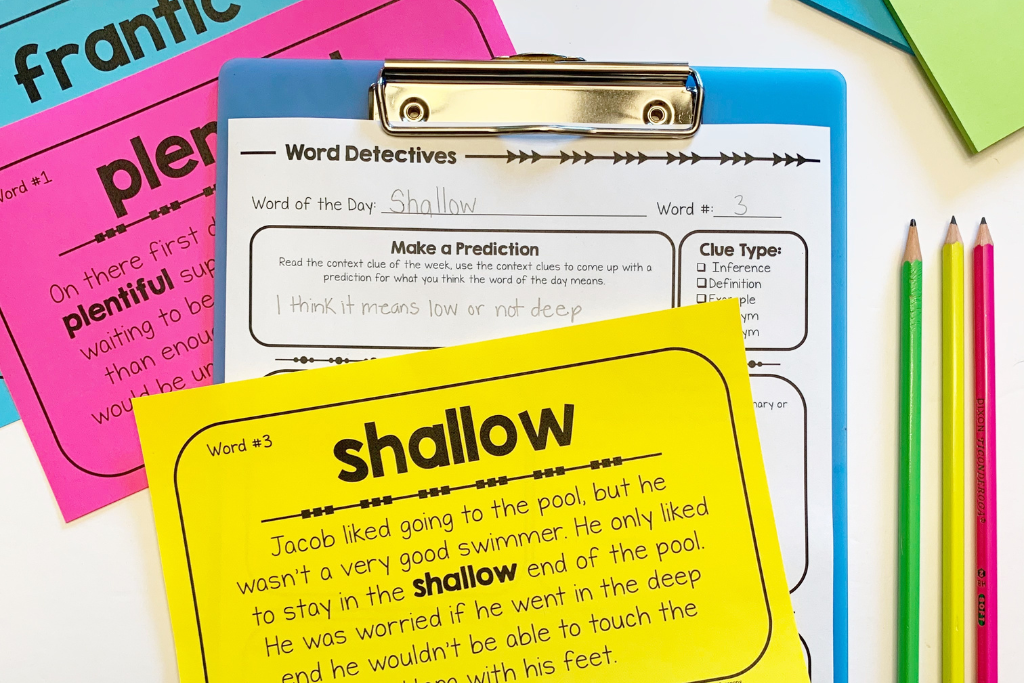
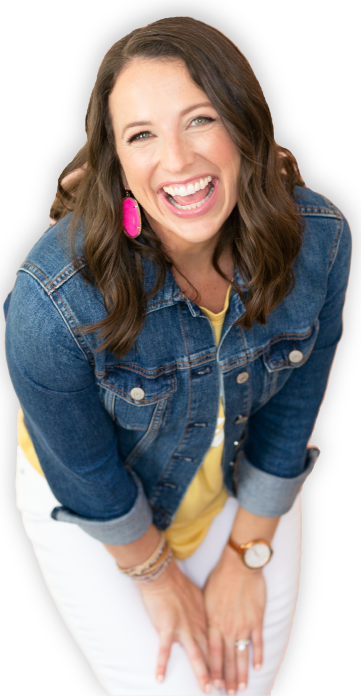
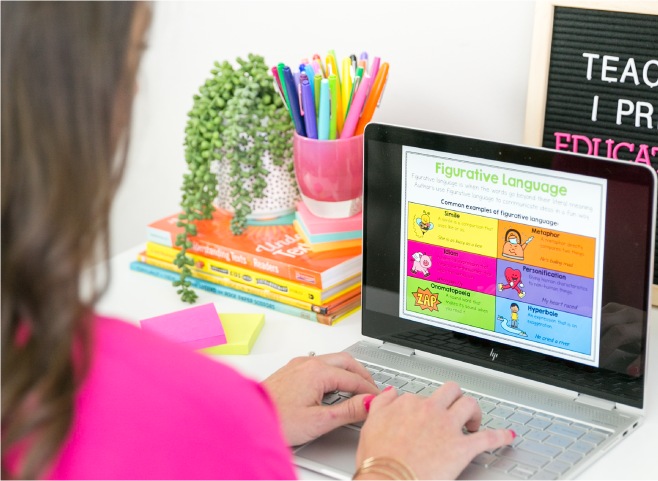
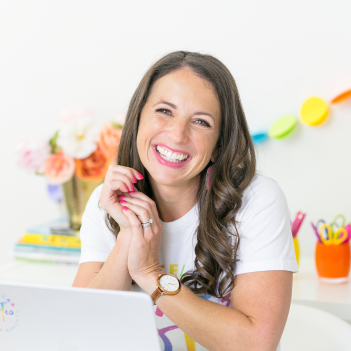
Leave a Comment
You must be logged in to post a comment.